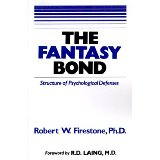How Your Critical Inner Voice Gets in the Way of Love
 There’s a nasty defense mechanism that undermines and sabotages your efforts to have love in your life: your critical inner voice. It comes at you from all sides; it goes after you, it badmouths your partner, it slams your relationship, and it attacks love in general. We are mostly unaware of this internal enemy and the subversive operation that it runs just below our consciousness. But we get a glimpse of it when we have a thought like, “He won’t be interested in me. I’m not in his league.” Or “I’m not sure about what I see in her. She’s not really all that great.” Or “Maybe we’re being too affectionate.” Or “Love always fades. I should never expect it to last.”
There’s a nasty defense mechanism that undermines and sabotages your efforts to have love in your life: your critical inner voice. It comes at you from all sides; it goes after you, it badmouths your partner, it slams your relationship, and it attacks love in general. We are mostly unaware of this internal enemy and the subversive operation that it runs just below our consciousness. But we get a glimpse of it when we have a thought like, “He won’t be interested in me. I’m not in his league.” Or “I’m not sure about what I see in her. She’s not really all that great.” Or “Maybe we’re being too affectionate.” Or “Love always fades. I should never expect it to last.”
What is this the critical inner voice?
The critical inner voice is a byproduct of the defenses we developed as children in order to cope with any stressful or painful events. It was formed early on when we were vulnerable youngsters trying to protect ourselves against frustration and emotional pain, and it was reinforced throughout our childhood, adolescence, and into adulthood.
This was part of a necessary coping strategy when we were very young, but as adults, we no longer need its protection. In fact, the critical inner voice actually limits us and prevents us from developing to our true potential, especially in our romantic relationships. It functions as a malevolent coach in our heads, making inaccurate interpretations of present day events and pessimistic predictions about the future based on negative experiences that occurred in our past.
It’s helpful to remember that the critical inner voice is the language of the defended, negative side of your personality, the side that is opposed to your ongoing personal development. It promotes feelings of self-doubt or inadequacy that interfere with you establishing a loving relationship or performing at your optimal potential. The positive side of your personality is the real you, the side that is undefended and made up of your unique qualities, such as physical attributes or ability, temperament, certain dispositions, and a natural identification with the positive traits your caregivers possessed.
All of this begs the question: Is there a way to bring your critical inner voice out into the open, so you can challenge it directly and stop it from interfering with you having what you want, and deserve, in life. The answer is: Yes!
How to challenge your critical inner voice
Using the Voice Therapy method, you can expose the critical inner voice by giving a voice to the negative thoughts and attitudes that are turning you against yourself and interfering with your achieving your personal goals. Once it is exposed, you can confront it and take constructive action to go against it. Here is a summary of this method, as it has been adapted for journaling in the upcoming book, Daring to Love:
- Identify your critical thoughts about yourself, using “I” statements. Write these statements down in your journal.
- Rewrite your “I” statements as “you” statements. These are expressions of attacks coming from your critical inner voice. Expand on them, continuing to rewrite them as “you” statements.
- Reflect on what you have written, and record any new thoughts and insights, as “I” statements.
- Confront the attacks coming from your critical inner voice, using “I” statements to stand up for yourself.
- Plan the actions you will take to counter the critical inner voice and the behavior, attitude, or emotion that it is supporting. Write these actions down, being detailed and specific about what you will do with respect to particular people, communication, behavior, situations, and so on.
- Implement your plan.
With this understanding of how to challenge your critical inner voice, let’s look at the different ways that this internal enemy tries to sabotage your love life.
Your critical inner voice attacks you.
The critical inner voice goes after you. Take, for example, the woman who tries to laugh off the thought, “He/she won’t be interested in me. I’m not in his/her league.” But then she takes a closer look by rewriting her thought as a “you” statement: He/she won’t be interested in you. You’re not in his/her league. Not so funny anymore. Continuing along that vein, Do you actually think he could be attracted to you? Don’t fool yourself. Now she’s getting to the heart of the matter, Do you think someone like that could love you? Now her critical inner voice is exposed, and she’s not laughing anymore. Now she’s thinking, “I don’t want to end up in the self-hating place that I often end up in. I want to fight for myself this time.” So, she confronts these attacks, “Stop evaluating me. Stop telling me what I do and don’t deserve. I will not let you undermine me. There is no ‘league’ that I am in or out of. Life is not the way you see it.” She feels relief from taking a strong position in relation to her critical inner voice, and she is able to continue to express her interest in and feelings for this man.
The critical inner voice attacks your partner.
The critical inner voice badmouths your partner. Consider the man who tries to ignore the thought, “I’m not sure about what I see in her. She’s not really all that great.” But instead he frames this thought as a “you” statement, What do you see in her? She’s not all that great. Then more attacks come, So, what’s the big deal about her? I don’t get it. She seems like a loser to me. And, finally, You could do better than her. Dump her! At first he’s confused. Then he’s reminded of how his mother thought no one was good enough for him. Once he makes this connection, he knows how he wants to confront these attacks, “I’m not listening to you and I’m not letting you influence me. If I did, I would leave every relationship I had. I value her, and I want to give this relationship a chance to develop.” And he does.
The critical inner voice attacks your relationship.
The critical inner voice slams your relationship. What about the woman who has the fleeting thought, “Maybe we’re being too affectionate.” When she starts to feel self-conscious and hold back her affection, she decides to translate this thought into the critical inner voice as a “you” statement, You two are being too affectionate. She continues, You’re all over each other. You’re so clingy. Then, with distain, Have some decency. Have some respect! You’re embarrassing yourselves. She feels angry at being talked to this way. The tone sounds like her mother’s voice, and she thinks of her parents’ cold, loveless relationship. She confronts this voice, “There’s nothing wrong with us or embarrassing about how we’re being. We’re expressing our love and we’re proud of it.” She feels confident and not self-conscious about her affection.
The critical inner voice attacks love in general.
The critical inner voice attacks love in general. Think of the man who says, “Love always fades. I should never expect it to last.” He decides that this might be a voice, and he rewrites this belief as a “you” statement. Love always fades. You should never expect it to last. His next thought is, All relationships are doomed. Only a fool believes in love. And then his voice says, Don’t even bother investing in a relationship. Spare yourself the disappointment and failure. At this point, he is able to see how destructive this advice is, and he stands up to his voice, “You don’t know what you’re talking about. I don’t have to be self-protective. I can be vulnerable and open to love. I want to take a chance on love. My life is more exciting when I do.”
Hang in there!
This advice for dealing with your critical inner voice may sound simplistic, especially in the context of a short blog. But it’s hard and takes perseverance. You are tackling a defense mechanism that’s been part of your life for a very long time. Confronting it will make you uncomfortable, and it’s going to bring up a lot of anxiety at first. The voice will get louder as you begin to challenge it, almost like a parent yelling at their child to get back in line. But if you hang in there and don’t let the voice influence your behavior, it will eventually give up, and its attacks will subside. It’s helpful to think of your critical inner voice as an internal monster that grows stronger when you feed it by listening to it and heeding its advice. But when you disregard it, you starve the monster and it fades away.
Does the critical inner voice ever go away completely? Of course not, we will always have self-critical thoughts, especially when we are vulnerable and developing ourselves in a new way. This is particularly true in a love relationship. But when we do start doubting ourselves, our partner, our relationship, or love in general, we can be aware that our critical inner voice is causing these attacks, and we can take steps to identify, confront, and take action to challenge it and stop it from getting in the way of our having a loving and gratifying relationship in our life.











Leave a Reply